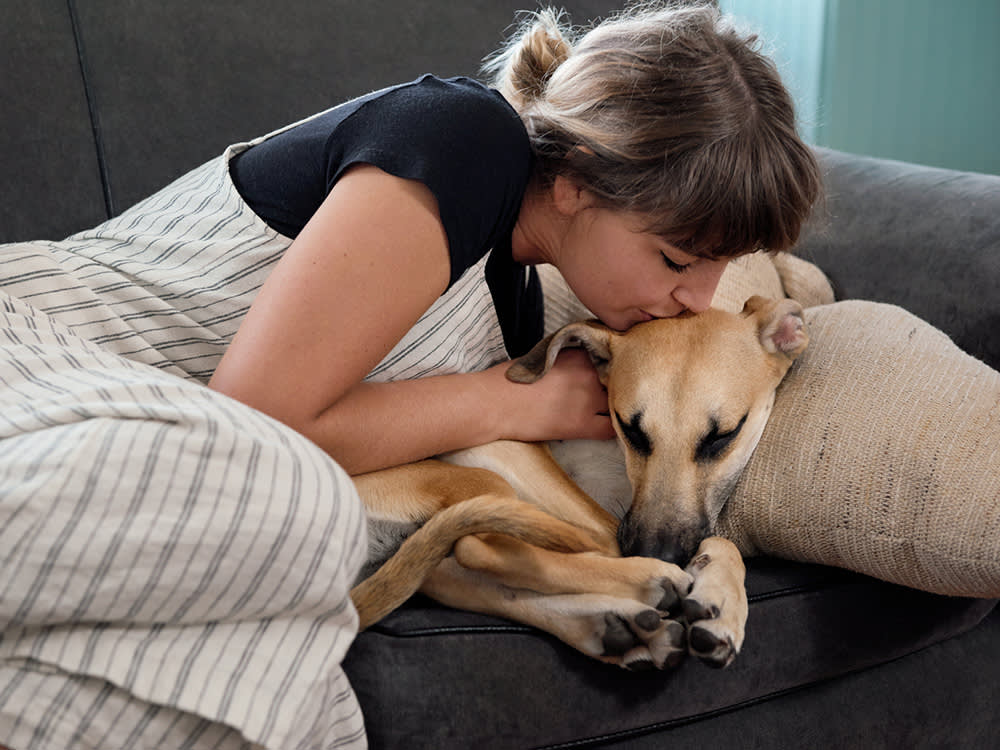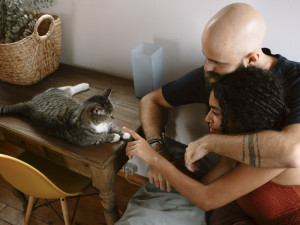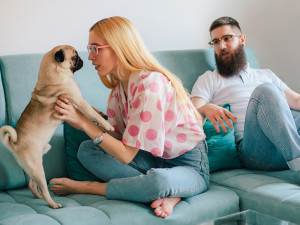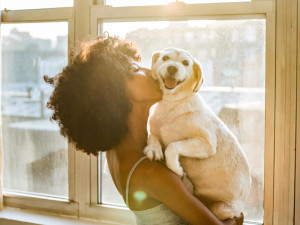Millennials Are Choosing Pets Over Kids, Study Finds
A study found that millennials are choosing pets over kids. Here’s why.

share article

Your pet wants you to read our newsletter. (Then give them a treat.)
Here’s a statistic that should not surprise you: More than halfopens in a new tab of all American households have a dog. As we all know, four years ago, COVID anxiety became the best marketing tool opens in a new tabever for animal adoptions. But there is an interesting twist here. As the number of pet parents has risen, human birthrates are at a historic low and have decreased by 3 percent even from 2022, per the CDCopens in a new tab. You know that single, cat-lady archetypeopens in a new tab? She may actually be a sign of the future.
“When animal adoptions skyrocketed during the height of the pandemic, our team asked the question: Are pets standing in for children among the millennial population?” explains Lily Velez, author of “As Birth Rates in US Plummet, Are Pets Standing in for Children?” and head of digital PR at Veterinarians.orgopens in a new tab. “This was the impetus for our survey, and we were amazed to see that 70 percent of respondents did indeed view their dog/cat as their child.”
Millennial women would rather have pets.
To understand what this means, it helps to look at millennial womenopens in a new tab, in particular. First, some figures, courtesy of the aforementioned reportopens in a new tab. Of the women surveyed who don’t plan on having children, 46 percent of them simply have no desire to raise them. Add to that a politically shaky — at best — atmosphere, environmental concerns, and economic instability (psychic residue from 2008’s Great Recession). Forty-two percent have said that the pandemic impacted their resolve to not have kids. If anything, those women would much rather have pets.
“Over the years, it’s been clear that millennials have bucked against many of the traditional milestones that have long stood as ‘rites of passage’ into adulthood, such as purchasing a home or getting married,” Velez says. “In light of declining birth rates, parenthood was clearly becoming yet another milestone millennials were either delaying or foregoing altogether.”
Enter the “furbaby,” or stress-free surrogates for kids. You can leave a pet alone. It’s easier to find daycare for them. They can be expensive, but are far less likely to rival the financial burden that children — and later, teens — create. You don’t have to uproot your social, romantic, or professional lives nearly as much to accommodate a pet. And as several studies show, pets can have a wonderful impactopens in a new tab on your mental health. Adds Velez: “Many women are deciding for themselves what a truly fulfilled life looks like for them, and sometimes, it simply doesn’t fit into the ‘traditional’ mold.”
But it’s not all selfish. The report also shows that pet parents are inclined to make concessions when it comes to accommodating their pet, from where they live (considering dog-friendly outdoor spacesopens in a new tab, for instance) to taking out loans for canine/feline medical treatments. These are all deemed worthy investments.
”While American ideals have typically defined a family as a household with children, the truth is that ‘family’ encompasses far more than that,” Velvez says. ”Ultimately, it includes those with whom you share a loving bond: whether that be with a romantic partner, or yes, a wet-nosed, tail-wagging, four-legged friend.”
References:
U.S. Fertility Rate Drops to Another Historic Lowopens in a new tab
As Birth Rates in US Plummet, Are Pets Standing In For Children?opens in a new tab

Nisha Gopalan
Nisha Gopalan has been a writer/editor for The New York Times, New York magazine, Entertainment Weekly, Variety, The Hollywood Reporter, and NYLON magazines. She currently resides in Los Angeles.
Related articles
![A woman sitting on a couch playing with a dog with her back to her partner.]() opens in a new tab
opens in a new tabWould You Date Someone Who Didn’t Like Your Pet?
Someone disliking a dog? Red flag. Someone asking their partner to give up their dog? Heartless!
![Man hugging his fluffy white dog happily]() opens in a new tab
opens in a new tabChemistry Between People and Dogs Is Real (It’s Science)
How the “love hormone” oxytocin connects us with our pups.
![Romantic Couple With A Dog On Bench]() opens in a new tab
opens in a new tabFinally, Dating Apps For Single Pet Parents
Will you accept this litter box?
![Woman holding her dog beside a window in bright morning light]() opens in a new tab
opens in a new tabPet Parents Get Separation Anxiety, Too
We asked both animal behaviorists and human psychologists how you can deal with leaving your dog home alone.





